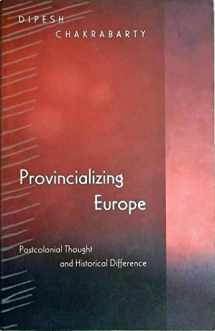
Provincializing Europe: Postcolonial Thought and Historical Difference
Book details
Summary
Description
Can European thought be dislodged from the center of the practice of history in a non-European place? What problems arise when we translate cultural practices into the categories of social science? Provincializing Europe is one of the first book-length treatments on how postcolonial thinking impacts on the social sciences. This book explores, through a series of linked essays, the problems of thought that present themselves when we think of a place such as India through the categories of modern, European social science and, in particular, history.
Provincializing Europe is a sustained conversation between historical thinking and postcolonial perspectives. It addresses the mythical figure of Europe that is often taken to be the original site of the modern in many histories of capitalist transition in non-Western countries. This imaginary Europe, Chakrabarty argues, is built right into the social sciences. The very idea of historicizing carries with it some peculiarly European assumptions about disenchanted space, secular time, and human sovereignty. Measured against such mythical standards, capitalist transition in the third world has often seemed either incomplete or lacking. Chakrabarty finds that "Nativism," however, is no answer to Eurocentrism, because the universals propounded by European Enlightenment remain indispensable to any social critique that seeks to address issues of social justice and equity. Provincializing Europe proposes that every case of transition to capitalism is a case of translation as well--a translation of existing worlds and their thought-categories into the categories and self-understandings of capitalist modernity. Chakrabarty demonstrates, both theoretically and with examples from colonial and contemporary India, how such translational histories may be thought and written. Provincializing Europe is not a project of shunning European thought. It is a project of globalizing such thought by exploring how it may be renewed both for and from the margins.


We would LOVE it if you could help us and other readers by reviewing the book
Book review





